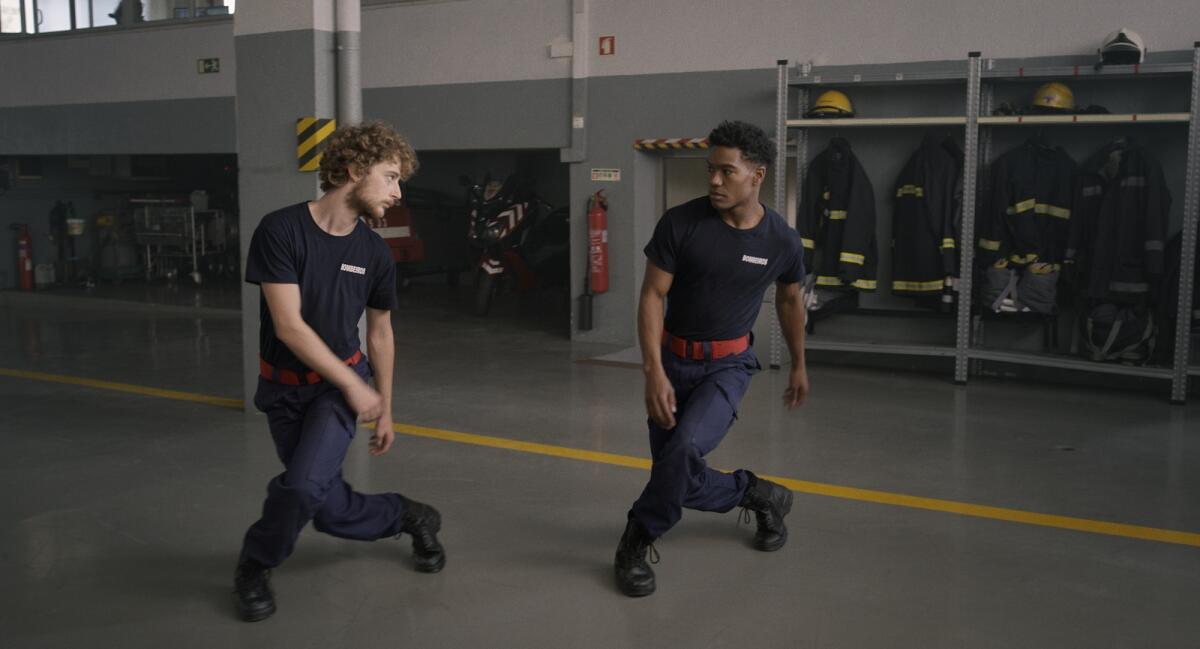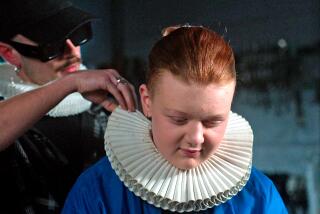Review: Nothing’s sacred in João Pedro Rodrigues’ erotically whimsical ‘Will-o’-the-Wisp’

There’s plenty of political commentary to unpack in the brisk whirlwind of erotic whimsy that is “Will-o’-the-Wisp.” Barely an hour long, the latest insolent marvel from Portuguese auteur João Pedro Rodrigues reinforces his expectedly subversive and sacrilegious tendencies, always paired with a pointedly tongue-in-cheek sense of humor.
His previous film, “The Ornithologist,” took us on a sundrenched excursion with a chiseled Catholic saint engaging in same-sex passion. Now, his chosen man of virtue, Alfredo (Mauro Costa), is a pale young prince with a vocation for public service and a phallic fixation with forests. Monarchs no longer rule Portugal, but in Rodrigues’ offbeat reality, they still do.
Concerned with the climate apocalypse, Alfredo recites Greta Thunberg’s now emblematic U.N. address before announcing to his conservative royal parents his desire to become a firefighter. Under the watch of an imposingly large painting depicting a group of Africans dressed in opulent attire, an inescapable nod to Portugal’s colonial past, this statement of youthful rebellion takes place in a static and ornate dinner shot.
Greta Lee and Teo Yoo play long-ago childhood sweethearts separated by time and distance but bound by memory in this exquisite debut feature from Celine Song.
Full frontal male nudity might be commonplace in Rodrigues’ oeuvre, but its presence always responds to a desire for thoughtful provocation. The moment Alfredo steps into the locker room of the fire station where his family’s influence gets him a job, men in jockstraps or fully nude test his knowledge of art history by re-creating famous paintings via suggestive poses. Amid the sensual stupor, the prince meets fellow hero-in-training and soon-to-be-lover Afonso (André Cabral). The two actors radiate a compatible exuberance.
Operating in a fantastical mode, Rodrigues gleefully plays with time jumps — from 2069, back to 2011, eventually landing in fateful 2020. His characters break the fourth wall and perform fully choreographed musical numbers, proving that Rodrigues has the same contempt for narrative restrictions as he does for thematic limitations. A dance centerpiece, a mating ritual for Alfredo and Afonso, shows Rodrigues at his most sincere. To him, it seems, only the impetuous attraction between two people is sacred.
Rodrigues is in the business of bluntly desecrating institutions and idols. Through his homoerotic tableaux vivants, he brings classic artworks down from their pedestal and turns them into expressions of carnal temptation. An early attempt at political correctness by Alfredo’s mother and the central interracial romance take jabs at society’s hypocrisy around race. The filmmaker mocks the machismo of uniformed service professions via his explicitly gay scenarios and laughs at the self-aggrandizing upper classes with a strenuous flatulence.
Sealed in the climax of mutual masturbation, Alfredo and Afonso’s torrid affair leaves an imprint in both of their memories. Still, a decision to uphold the status quo and fall into heteronormativity threatens the possibility of a future together. Like the fiery folklore entity that lends it its name, “Will-o’-the-Wisp” burns bright with idiosyncratic ambition. Few cineastes out there are making deliciously defiant art like Rodrigues, and this entry in his catalog is a concentrated shot of his sardonic mastery.
‘Will-o'-the-Wisp’
In Portuguese with English subtitles
Not rated
Running time: 1 hour, 7 minutes
Playing: Starts June 2, Landmark Nuart
More to Read
Only good movies
Get the Indie Focus newsletter, Mark Olsen's weekly guide to the world of cinema.
You may occasionally receive promotional content from the Los Angeles Times.











